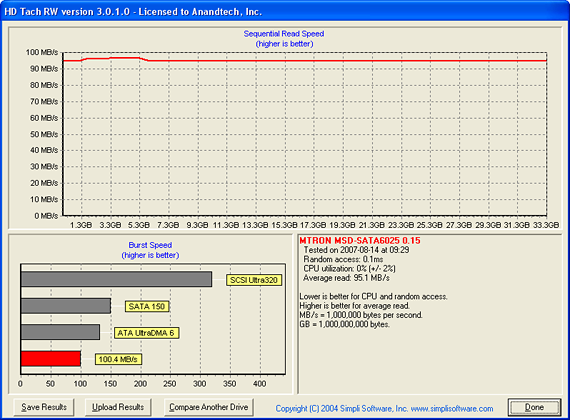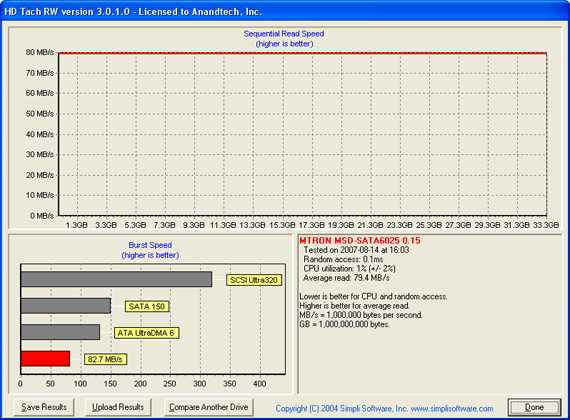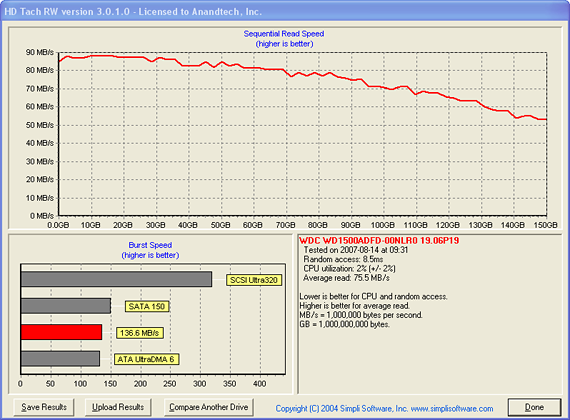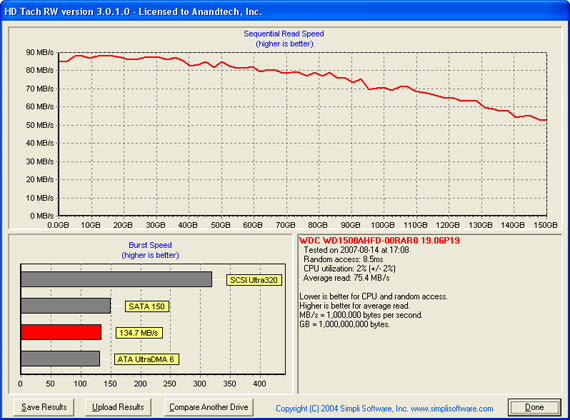MTRON SSD 32GB: Wile E. Coyote or Road Runner?
by Gary Key on August 15, 2007 3:00 AM EST- Posted in
- Storage
HD Tach 3.0
MTRON 32GB SSD NV680i
MTRON 32GB SSD Intel ICH9R
Our first screenshot is the MTRON drive installed on the NVIDIA 680i controller chipset and indicates a sustained transfer rate of 95.1 MB/sec with a burst rate of 100.4 MB/sec. The same drive on the Intel ICH9R scores a sustained transfer rate of 79.4 MB/sec with a burst rate of 82.7 MB/sec. The Intel controller is up to 17% slower with the MTRON SSD drive in this particular benchmark.
We tried several different P35 boards equipped with the ICH9R and a couple of P965 boards with the ICH8R and had the same results where our SSD drives topped out around 80 MB/sec with these particular Intel Southbridge designs. This occurred under Windows XP and Vista with a variety of Intel INF revisions. Our NVIDIA based 680i and 650i boards did not exhibit this particular issue under either operating system.
The MTRON drive features an outstanding access time of 0.1ms or lower which greatly assists in random read times. The lack of higher sustained or maximum transfer rates on the Intel chipsets will adversely affect the drives performance in most of our benchmarks but we must temper our performance expectations as you will see shortly. In the synthetic benchmarks we will find wide disparities in certain tests, but in our actual application tests the differences were rather minimal in most cases.
WD Raptor 150GB NV680i
WD Raptor 150GB Intel ICH9R
We are also including HD Tach results for the WD Raptor 150GB drive for comparison. The differences between the two controller chipsets are extremely minor with this drive and other mechanical drives we have tested to date. The Raptor's sustained transfer rate of 75.5 MB/sec is around 21% lower than the MTRON SSD drive on the NVIDIA controller and about 5% lower on the Intel chipset. The burst rates of the Raptor are about 36% higher than the MTRON unit.
MTRON 32GB SSD NV680i
 |
| Click to enlarge |
MTRON 32GB SSD Intel ICH9R
 |
| Click to enlarge |
Our first screenshot is the MTRON drive installed on the NVIDIA 680i controller chipset and indicates a sustained transfer rate of 95.1 MB/sec with a burst rate of 100.4 MB/sec. The same drive on the Intel ICH9R scores a sustained transfer rate of 79.4 MB/sec with a burst rate of 82.7 MB/sec. The Intel controller is up to 17% slower with the MTRON SSD drive in this particular benchmark.
We tried several different P35 boards equipped with the ICH9R and a couple of P965 boards with the ICH8R and had the same results where our SSD drives topped out around 80 MB/sec with these particular Intel Southbridge designs. This occurred under Windows XP and Vista with a variety of Intel INF revisions. Our NVIDIA based 680i and 650i boards did not exhibit this particular issue under either operating system.
The MTRON drive features an outstanding access time of 0.1ms or lower which greatly assists in random read times. The lack of higher sustained or maximum transfer rates on the Intel chipsets will adversely affect the drives performance in most of our benchmarks but we must temper our performance expectations as you will see shortly. In the synthetic benchmarks we will find wide disparities in certain tests, but in our actual application tests the differences were rather minimal in most cases.
WD Raptor 150GB NV680i
 |
| Click to enlarge |
WD Raptor 150GB Intel ICH9R
 |
| Click to enlarge |
We are also including HD Tach results for the WD Raptor 150GB drive for comparison. The differences between the two controller chipsets are extremely minor with this drive and other mechanical drives we have tested to date. The Raptor's sustained transfer rate of 75.5 MB/sec is around 21% lower than the MTRON SSD drive on the NVIDIA controller and about 5% lower on the Intel chipset. The burst rates of the Raptor are about 36% higher than the MTRON unit.










37 Comments
View All Comments
Frumious1 - Thursday, August 16, 2007 - link
I don't think an SSD in a notebook is really going to affect battery life that much. There was a laptop review that made this point just the other day: http://www.anandtech.com/mobile/showdoc.aspx?i=306...">see the last 3 paragraphs. If you have a low power laptop, it could probably cut 1-2W power and add maybe 15 minutes of battery life. 2.5" drives also aren't particularly hot, so it won't make a huge difference there. Now, performance would be faster for sure, since laptop drives are also slow, but $1500 or whatever for one of these puppies? I'll pass!ciparis - Wednesday, August 15, 2007 - link
I may have missed it in the article -- was there a discussion of Windows boot times? That plus hibernate / sleep would be interesting. More comprehensive application launch time comparisons would be nice as well.PandaBear - Wednesday, August 15, 2007 - link
With this kind of performance I think the target is not laptop but rather database servers that need very very fast seq and random access. They can afford a couple of these drives, easily.But then again, will a RAM based device like Gigabyte's work better? and how long would they last (i.e. how good is MTRON's wear leveling?)
brundlefly - Saturday, August 18, 2007 - link
Actually I have this disk and it outperforms every mechanical I have ever used in every scenario (server, database, notebook, desktop) (and I have 15k Fujitsu MAS UltraSCSI's, Raptors, and Hitachi 7k200). See my post below about MySQL performance, which is why I got the drive.There is no reason or desire to have a mechanical device in any computer, it doesn't even make any sense, its just the best solution weve had until the price, performance, size, and durability of SSD matured.
BTW MTRON states you can write or erase 50GB/day for 140 years before any cells turn read-only. Thats longer then the MTBF for a raptor.
StraightPipe - Wednesday, August 15, 2007 - link
I'd love to see how one of these drives performs in multi-access enviroments. Can you run a server test or two (RAID would also be nice) to see how they do?I can't see too many home users picking these up for their desktops, but it's always nice to have another option. the 3.5" even goes to 128MB, it's about the same as my 160GB Raptor. Price is still way high, but like all good memory, it only gets cheaper :)
Right now the pricing is set so it is most viable for the enterprise market.
StraightPipe - Wednesday, August 15, 2007 - link
From the Tom's article listed above:"Writing to lots of different cells slows the SSD down so much that even conventional 2.5" hard drives offer better I/O and file-write performance. "
So this is probably not what you want for many server applications.
For a webserver this fast read, no write scenario may be ideal.
jaybuffet - Wednesday, August 15, 2007 - link
http://www.adtec.co.jp/direct/index.php/product/18...">http://www.adtec.co.jp/direct/index.php/product/18...Is that $1600 USD?
Their mainpage shows the 32GB version for about $850 USD
brundlefly - Wednesday, August 15, 2007 - link
I cant read Japanese but 198,000 yen = $1700 USD ?jaybuffet - Wednesday, August 15, 2007 - link
Those are 3.5" drive versions i guess. According to the bottom of http://mtron.net/eng/sub_eb1.asp">http://mtron.net/eng/sub_eb1.asp their is also a 128GB 3.5" availableEODetroit - Wednesday, August 15, 2007 - link
... It might be interesting to compare the speeds here with those from Gigabyte's old I-Ram.